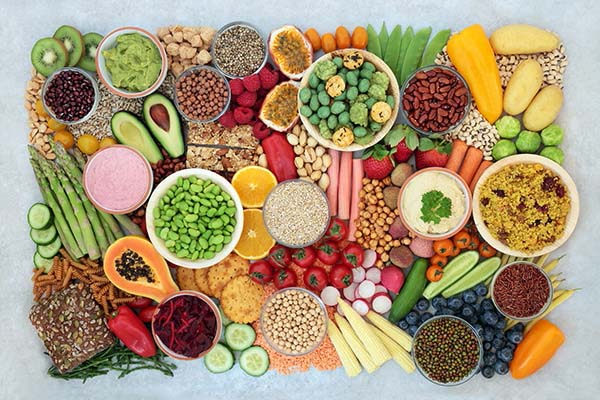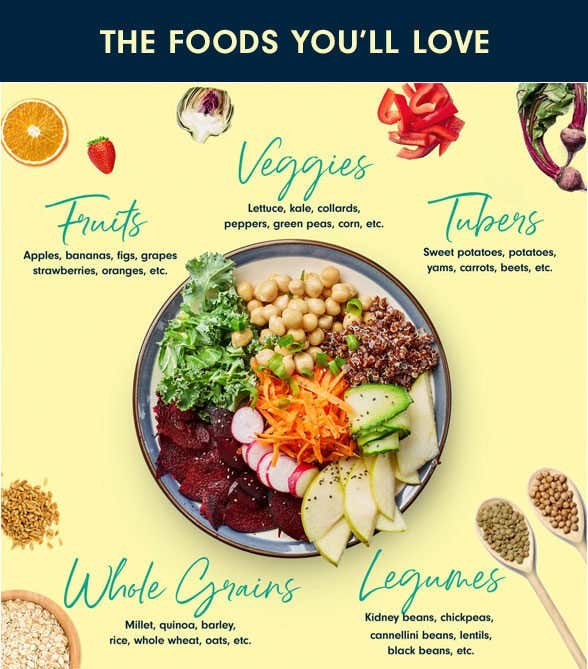Plant Based Beef vs. Traditional Meat: Which Is Better for the Environment?
All Concerning Healthy Food: Advantages of Embracing Plant Based Alternatives
The discussion bordering plant-based diet regimens has actually gotten significant attention in the last few years. Many people are checking out the prospective health advantages, nutritional advantages, and environmental impacts associated with these nutritional choices. As people become extra knowledgeable about their food's influence on well-being and sustainability, questions emerge concerning the practicalities of adopting such a way of living. What details modifications can one expect, and exactly how might these options reshape not just personal health and wellness however likewise the planet's future?
Recognizing Plant-Based Diets
Although many individuals associate plant-based diet regimens primarily with vegetarianism or veganism, these diet plans can encompass a wide variety of consuming patterns that prioritize entire, minimally processed plant foods. Such diets often consist of fruits, veggies, whole grains, seeds, nuts, and beans, while restricting or eliminating animal products. This adaptability allows people to customize their nutritional options according to individual preferences and nutritional demands. Some may adopt a mostly plant-based diet regimen while still occasionally consuming meat or dairy products, commonly referred to as a flexitarian method. The emphasis continues to be on integrating even more plant foods, which can result in a varied array of dishes and flavors. Comprehending these different interpretations of plant-based consuming is essential for appreciating its accessibility and allure in contemporary food culture.
Health Benefits of Plant-Based Foods
The health and wellness advantages of plant-based foods are substantial, supplying a nutrient density advantage that sustains total health. Study indicates that these foods can enhance heart wellness and play an essential role in efficient weight monitoring. By including extra plant-based alternatives, people may enhance their dietary options and promote lasting health and wellness.
Nutrient Thickness Benefit
Nutrient thickness plays a crucial function in the health benefits of plant-based foods, making them a compelling selection for those looking for a well balanced diet plan. Plant-based foods, such as fruits, vegetables, beans, nuts, and whole grains, are often abundant in necessary vitamins, minerals, and antioxidants while being lower in calories. This high nutrient density permits people to eat less calories while still fulfilling their nutritional needs. Furthermore, these foods are loaded with dietary fiber, promoting digestive wellness and aiding in weight monitoring. By incorporating nutrient-dense plant-based choices, customers can boost their total health, support their immune systems, and minimize the danger of persistent illness. Ultimately, the nutrient thickness of plant-based foods highlights their significance in a health-conscious lifestyle.
Heart Wellness Enhancement

Weight Administration Support
Along with promoting heart health and wellness, a plant-based diet plan can considerably help in weight management. This nutritional technique emphasizes entire foods such as fruits, vegetables, beans, nuts, and whole grains, which are normally lower in calories and greater in fiber contrasted to animal-based products. The high fiber content aids boost satiation, minimizing total calorie intake. Plant-based diet regimens are typically abundant in important nutrients while low in harmful fats, making it simpler to keep a healthy weight. Research indicates that people who adopt a plant-based lifestyle tend to have reduced body mass indexes (BMIs) and experience even more effective fat burning compared to those who take in meat-heavy diet regimens. As a result, welcoming plant-based options is a tactical selection for reliable weight management
Nutritional Worth of Plant-Based Ingredients
Plant-based ingredients are rich in necessary nutrients, offering a diverse range of vitamins, minerals, and anti-oxidants that add to total health and wellness. A comparison of protein sources exposes that while pet products are frequently considered as remarkable, numerous plant-based alternatives supply ample healthy protein and various other useful compounds. Understanding the dietary worth of these active ingredients can help individuals make notified dietary choices.
Essential Nutrients in Plants
Nutrient-rich components located in plants supply a varied array of vital nutrients that contribute significantly to overall wellness. These components are rich in vitamins A, C, and K, which support immune feature, vision, and blood clotting, specifically. Additionally, plants offer vital minerals such as calcium, potassium, and magnesium, critical for heart wellness, muscle mass function, and bone strength. The visibility of fiber in plant-based foods aids food digestion and advertises a healthy intestine microbiome. Antioxidants, located generously in veggies and fruits, assistance fight oxidative anxiety and reduce inflammation. Lots of plant foods are low in calories yet high in nutrients, making them a superb choice for those looking for to preserve a healthy and balanced weight while guaranteeing ideal nutrient consumption.

Comparing Healthy Protein Resources
Protein sources vary considerably in their dietary accounts, with plant-based active ingredients using special benefits. Unlike pet healthy proteins, which often have hydrogenated fats and cholesterol, plant proteins often tend to be reduced in these harmful elements. Legumes, nuts, seeds, and whole grains are abundant in crucial amino acids, fiber, vitamins, and minerals. For circumstances, lentils supply high protein content along with substantial iron and folate, while quinoa is a total protein, supplying all 9 vital amino acids. Furthermore, plant-based healthy proteins are usually come with by antioxidants and phytochemicals that support general health and wellness. The shift to plant-based healthy protein sources not just improves nutritional consumption however additionally lines up with lasting nutritional practices, lowering environmental effect and promoting long-lasting wellness benefits.
Ecological Impact of Plant-Based Consuming
As understanding of climate adjustment Continued grows, lots of individuals are exploring lasting nutritional choices that can substantially reduce their environmental footprint. Plant-based consuming has actually emerged as a considerable factor to decreasing greenhouse gas exhausts, which are primarily related to animals production. The farming of fruits, grains, beans, and veggies typically needs less sources, such as water and land, compared to animal farming. Furthermore, plant-based diet regimens can bring about decreased deforestation, as much less land is required for grazing animals or expanding pet feed. By shifting towards plant-based choices, customers can sustain biodiversity and advertise much healthier ecosystems. In general, embracing plant-based eating not just advantages individual health and wellness yet also represents a crucial action towards ecological sustainability and preservation initiatives.
Conquering Common Misconceptions
While many individuals recognize the advantages of a plant-based diet, several misunderstandings commonly prevent them from totally welcoming this way of living. An my latest blog post usual idea is that plant-based diet plans lack enough protein; nonetheless, numerous plant resources, such as vegetables, nuts, and tofu, supply adequate protein. Additionally, some assume that this diet is expensive, when in fact, staples like beans, rice, and seasonal veggies can be rather budget friendly. An additional misconception is that plant-based eating is extremely limiting, whereas it really provides a varied range of foods and tastes. Finally, numerous stress that a plant-based diet plan might bring about deficiencies, yet with proper preparation, individuals can get all needed nutrients, including nutrients, while delighting in a wide range of delicious meals.
Tips for Transitioning to a Plant-Based Way of living
Making the shift to a plant-based way of living can be an enriching experience, though it usually requires some advice to navigate the preliminary changes. People are urged to start slowly, incorporating more fruits, veggies, beans, and whole grains into their dishes while decreasing meat and dairy products intake. Meal planning is important; preparing an once a week menu can help alleviate the adjustment and prevent final unhealthy choices. Checking out brand-new recipes and cooking approaches can also boost the experience and preserve excitement about plant-based eating. Furthermore, signing up with support system or communities can offer motivation and share useful pointers. Staying informed about nourishment assurances balanced meals, avoiding deficiencies while promoting a healthy and balanced, gratifying plant-based way of life.

Delicious Plant-Based Dish Concepts
Checking out delicious plant-based meal concepts can motivate individuals to welcome a much more nourishing diet. One prominent choice is a hearty quinoa salad, including cherry tomatoes, cucumber, and a zesty lemon-tahini dressing. One more fave is a savory lentil stew, loaded with carrots, celery, and fragrant herbs, best for a calming supper. For morning meal, over night oats made with almond milk, chia seeds, and topped with fresh berries supply a nourishing beginning to the day. Additionally, a lively veggie stir-fry with tofu and a selection of colorful veggies can be a quick yet satisfying dish. Finally, velvety avocado salute on whole-grain bread, sprayed with seeds and seasonings, uses a straightforward yet flavorful snack. These meals showcase the range and richness of plant-based eating.

Often Asked Questions
Can a Plant-Based Diet Regimen Supply Enough Protein?
The concern of whether a plant-based diet can give enough healthy protein prevails. Many sources, consisting of legumes, nuts, seeds, and entire grains, can meet healthy protein needs effectively, sustaining a nutritious and well balanced diet for people.
Are Plant-Based Diets Suitable for Kid?
The suitability of plant-based diet regimens for kids relies on mindful preparation. Adequate nutrients need to be guaranteed, consisting of minerals, vitamins, and healthy proteins. With proper support, such diet plans can support healthy development and development in kids.
Exactly how Do I Eat in restaurants on a Plant-Based Diet regimen?
Dining out on a plant-based diet More Help plan entails seeking restaurants with diverse food selections, asking for adjustments, and checking out vegan-friendly choices. Preparation ahead and interacting nutritional choices can enhance the eating experience while maintaining dietary options.
What Prevail Allergens in Plant-Based Foods?
Common irritants in plant-based foods include soy, gluten, nuts, and seeds - BBQ Sauces. Individuals following a plant-based diet plan must be aware of these allergens and read labels very carefully to avoid negative responses and assure secure intake
Can Plant-Based Diets Aid With Weight Reduction?
Research study shows that taking on a plant-based diet regimen might promote weight-loss because of its commonly reduced calorie thickness and greater fiber material. This mix can improve satiation, assisting people handle their calorie intake efficiently. Lots of individuals link plant-based diet plans primarily with vegetarianism or veganism, these diet plans can incorporate a large variety of eating patterns that prioritize whole, minimally processed plant foods. Nutrient thickness plays a necessary role in the health advantages of plant-based foods, making them an engaging selection for those seeking a well balanced diet regimen. Plant-based diet regimens have been revealed to markedly boost heart wellness, as they typically contain components that support cardio feature. In addition to promoting heart health and wellness, a plant-based diet can substantially help in weight management. A typical idea is that plant-based diets lack adequate healthy protein; nevertheless, numerous plant sources, such as beans, nuts, and tofu, provide enough protein.